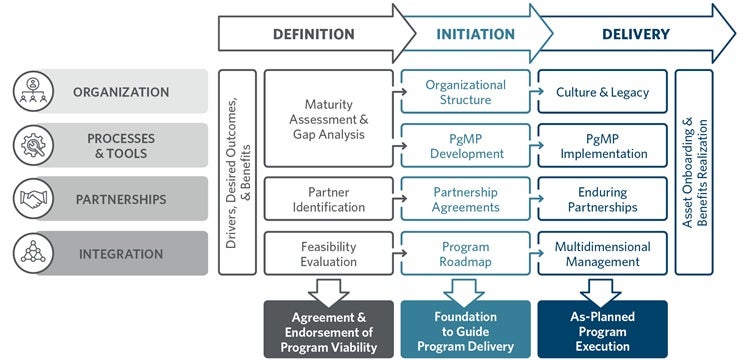One Water Program Management: A Knowledge Base and Guidance Manual

One Water Program Management: A Knowledge Base and Guidance Manual
The Water Industry’s First Research Project of its Kind on Program Management (WRF #5196)
HDR is partnering with the Water Research Foundation and the Los Angeles Department of Water & Power to advance the water industry’s state of knowledge on program management. Using a program management approach, water infrastructure owners can improve a larger number of assets more effectively and achieve benefits and control not available if projects were to be managed individually. The four-year project, which was initiated in October 2022, aims to provide foundational guidance on the planning and delivery of water infrastructure programs. Underlying project objectives include:
- Increasing the adoption of a program management approach within the industry to help utilities and consultants improve a larger number of assets more effectively and achieve benefits and control not available by managing projects individually.
- Building high-performance, integrated program teams by improving coordination and collaboration across multiple program partners, including utilities, consultants and construction contractors.
Background and Project Rationale
The American Society of Civil Engineers' 2021 report cards assigned the nation’s drinking water, stormwater and wastewater infrastructure grades of C-minus, D and D-plus, respectively. At the same time, water utilities are facing unprecedented challenges, including staff shortages amplified by a tight labor market and economic uncertainty fueled by inflationary pressures, material cost variability and supply chain issues. The need to upgrade our water infrastructure is undeniable. Other industry drivers substantiating the call for implementing large-scale capital improvement programs include:
- The need for regional and large-scale initiatives to address water supply deficiencies, the degradation of various water bodies, future natural disasters and others.
- Schedule requirements associated with regulatory compliance, grant conditions, legislative mandates, aging infrastructure and others.
- Increased demand and need for one water, integrated solutions.
Approach
The program management best practices to be developed as part of this project will draw on the outcome of a comprehensive literature review of diverse publications, a detailed survey of U.S. and international utilities with program management experience, and workshops with agency participants. The guidance developed as part of the study will be tested using a case study focused on the Pure Water Los Angeles Program.
To maximize the value and impact of a project or program, consider refining its scope to integrate the One Water perspective. Applying a One Water perspective helps utilities identify multiple benefits and look beyond the core water infrastructure needs, uncovering opportunities to deliver broader environmental, community and economic value. We have been utilizing the "A-I-R" process — Assess, Identify and Reimagine — on WRF 5196 to activate these expanded benefits of One Water while transforming traditional approaches into innovative, multidimensional solutions.
Research Outcomes
Multi-Faceted Framework: Creating an adaptable, stepwise blueprint on how to structure the implementation of water programs to drive efficiency, accountability and quality.
Program Management Best Practices: Compiling proven and effective methods, processes and tools to optimize the planning and delivery of water programs of all types and sizes.
One Water Vision: Applying One Water principles to achieve business, community, and environmental benefits that extend beyond the initial desired program outcome.
High-Performance Teams: Creating highly collaborative, fully integrated program teams and partnerships unified by a common purpose and driven by a vision of success.
Project Partners and Participating Agencies
Project Partners:
- City of Los Angeles Department of Water & Power
- City of Los Angeles Sanitation & Environment
Agency Participants:
- Aguas de Portugal Internacional/AdP Valor Grupo Aguas de Portugal
- City of San Diego Public Utilities Department
- City of San Francisco Public Utilities Commission
- Hampton Roads Sanitation District
- High Speed 2
- Indian River County
- Johnson County Wastewater
- Los Angeles World Airports
- Metropolitan Water District of Southern CA
- Miami-Dade Water & Sewer Department
- Passaic Valley Sewerage Commission
- Philadelphia Water Department
- Region of Peel Water & Wastewater












